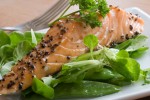 There’s no magic formula for healthy eating. But there are some general rules that apply: eating a balanced diet high in fruits and vegetables, lean protein, healthy fat, legumes, and whole grains is the best way to defend against aging and chronic illness. Conversely, feasting on processed foods, refined grains, and sugary snacks and beverages and indulging in deep-fried foods increases the risk for the conditions a healthy diet prevents.
There’s no magic formula for healthy eating. But there are some general rules that apply: eating a balanced diet high in fruits and vegetables, lean protein, healthy fat, legumes, and whole grains is the best way to defend against aging and chronic illness. Conversely, feasting on processed foods, refined grains, and sugary snacks and beverages and indulging in deep-fried foods increases the risk for the conditions a healthy diet prevents.
But what about these superfoods we all keep hearing about? Shouldn’t we focus on the specific food items known to have the most health benefit? Let me give you my take on these superfoods, plus the top 4 foods to eat as part of an overall balanced diet (even if we don’t call them “super!”).
Superfoods: Don’t Believe All the Hype
I’m not big on the word “superfood.” I don’t think foods can be “super;” I do think that if it comes packed naturally (i.e. unprocessed), it’s good for you. Someone who eats “superfoods” exclusively is probably worse off than someone with a balanced diet that includes a good mix of everything. That’s the key; don’t rely on these magical superfoods—you don’t need to eat them at every meal or even every day—but you should include them on a regular basis along with a variety of other food items.
Top 4 Foods to Eat as Part of Your Balanced Diet
With all of that in mind, today I’m going to tell you about three foods with amazing health benefits that are easy to incorporate into your daily regimen along with your other dietary choices and that can help provide protection from illness and disease as you age.
1. Apples
“An apple a day keeps the doctor away:” sounds cheesy, but it’s not just a catch phrase. There is conflicting research on whether or not this is true, but it has been found that people who eat apples regularly take less prescription medication. This could be due to the fact that apples are a great source of fiber and antioxidant flavonols. The many health benefits of apples include whiter teeth, protection from Alzheimer’s and Parkinson’s, improved digestion and cholesterol levels, and reduced risk of diabetes. Grabbing an apple on the go is an easy way to improve your diet and health.
2. Leafy Greens
Opting for a side salad or even making the decision to make a salad the bulk of your meal is easy and highly health-conscious. Leafy greens like spinach, kale, and arugula are rich in vitamins, minerals, antioxidants, and fiber. Plus they can help reduce the risk of conditions like weight gain, diabetes, heart failure, and nutrient deficiencies.
3. Salmon
Salmon is the best source of those extremely important omega-3 fatty acids. Omega-3s reduce cholesterol, lower blood pressure, and potentially improve brain health. Salmon is also rich in vitamin E, which helps fight aging. Try eating a three-ounce serving twice per week to experience the myriad benefits of omega-3s (a highly under-consumed nutrient in North America).
4. Nuts
Nuts of any variety are the nutritious, on-the-go snack that’s easy to include in your day. Rich in healthy fats, vitamins, and minerals, a handful of nuts per day can help reduce cholesterol, improve heart health, and even have positive effects on your brain function. Just be sure to buy raw or roasted nuts, not candied selections. And go easy on the salted nuts.
Sources for Today’s Article
University of East Anglia, “Eating Flavonoids protects men against Parkinson’s Disease, study finds,” Science Daily web site, April 4, 2012; https://www.sciencedaily.com/releases/2012/04/120404161939.htm, last accessed July 18, 2016.
American Chemical Society, “Compound in Apples May Help Fight Alzheimer’s Disease,” Science Daily web site, November 16, 2004; https://www.sciencedaily.com/releases/2004/11/041116215006.htm, last accessed July 18, 2016.
“Two Apples a day ‘keeps the heart doctor away’” NHS web site, July 27, 2012; http://www.nhs.uk/news/2012/07July/Pages/Two-apples-a-day-keeps-heart-doctor-away.aspx, last accessed July 18, 2016.
